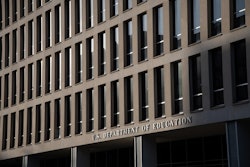 President Lyndon B. Johnson signs the Higher Education Act of 1965
President Lyndon B. Johnson signs the Higher Education Act of 1965
“On a campus tour at ITT, they bragged about their job placement rates for graduates, saying that 90% of their graduates get a job right out of the gate, with average salaries starting around $60-$70,000 a year,” said Whitehead. “That was not true. The experience was nothing like what I had been promised.”
Whitehead was left with about $50,000 in student loan debt, and his testimonial is one of thousands of borrowers who have called for tighter regulations of the for-profit college industry. The U.S. Department of Education (ED) since found that ITT Tech made exaggerated claims about its graduates landing jobs.
“ITT may be closed, but I have to live with the debt and frustration that they left behind,” said Whitehead.
Greater oversight of the for-profit college sector may be underway. ED next week will begin debating a rule that could more stringently regulate for-profits. Through public sessions called negotiated rulemaking, ED negotiators will discuss several issues with stakeholders, including student loan borrower advocates and for-profit college representatives. One such issue will be a rule called Gainful Employment (GE).
At a press briefing this week, several education policy experts and advocates said that this GE rule is key to holding for-profits accountable.
The federal Higher Education Act (HEA) requires that all career education programs that receive federal student aid “prepare students for gainful employment in a recognized occupation.” But HEA does not define “gainful employment.” So, in 2014, ED adopted a rule that defined GE to make sure graduates of federally-funded career education programs earned enough money to pay back the debt they took on to enroll in the programs. During the Trump administration, however, this GE rule was rescinded and has not yet been restored under Biden.
Meanwhile, student completion rates at for-profit colleges remain lower on average than at nonprofit colleges. Student loan default rates are also higher on average among people who attend for-profits versus nonprofits.
“We should restore the original promise of the Higher Education Act,” said Amanda Martinez, a senior education policy analyst at UnidosUS, a Latino civil rights organization, at this week’s press briefing. “It was a civil rights law built on the idea that education is essential to all Americans… But in an unregulated market, that promise is being broken by one specific sector: for-profits.”
Martinez pointed out how students of color disproportionately enroll in for-profits, which she argued makes for-profit regulations a racial justice and civil rights issue. A July 2021 report from the Student Borrower Protection Center, a nonprofit and nonpartisan research and advocacy group, found that for-profit schools are about twice as likely to be located in majority Latino or majority Black zip codes compared to majority white zip codes.
Yet during ED’s rulemaking next week, GE will be one of seven topics on the table. Jared Bass, senior director of the Center for American Progress, a nonpartisan policy institute, said that he wonders how much air time GE will get relative to other critical issues up for debate.
“It will also be interesting to see what changes the Department will make,” added Bass at the press briefing. “How much will the Department rely on the 2014 Gainful Employment rule? Will there be a significant departure from it?”
To Amy Laitinen, director for higher education at New America, a public policy think tank, a GE rule is critical to implement the law already in place under HEA. She and Bass noted as well that they will be curious to see which alliances will form among negotiators during rulemaking about GE.
“Who is going to end up supporting this—and who isn’t?” said Laitinen at the press briefing. “We know the for-profit industry in particular has fought gainful employment every step of the way over the last decade. But it will be interesting to see how other various factions align on this.”
Whitehead said that he will be closely watching what for-profit college regulations will come: “Schools need to be held accountable for their lies because they have the power to destroy our lives."
Rebecca Kelliher can be reached at rkelliher@diverseeducation.com.
















